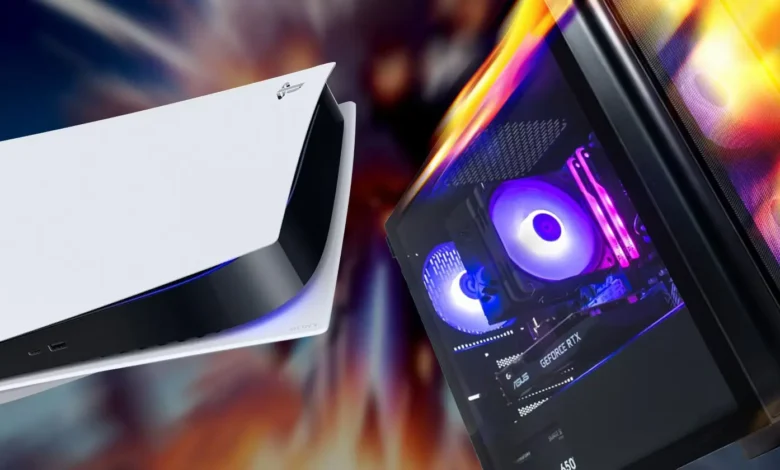Making a PC with the same specifications as the PS5, how much will it cost and what will be the results?

The PS5 is the most comfortable platform to choose from among any other platform, especially when compared to a PC. Since the PC requires some thought and research when creating a custom build, it is somewhat difficult to reach similar specifications to the PlayStation 5 due to the differences in the architecture and basic designs between the two platforms.
We will not be making this comparison just to build a PC that is exactly like the PS5, but to determine the adaptation of games to both platforms and choose the best option between them and finally make a price comparison.
PS5 Specifications
Although we know how the platform performs, the specifications are something that many users do not know about, which include:
- AMD Zen 2 octa-core CPU clocked at 3.5GHz.
- RDNA 2 GPU with 10 teraflops.
- 825GB SSD storage drive.
- 16GB RAM.
These specifications are considered excellent for home platforms at the present time and indicate its ability to run games with very high graphics, in addition to the storage disk that comes with an SSD type to speed up loading times that have actually become a hundred times faster than the PlayStation 4.
Aside from the hardware specs, the platform is capable of supporting ray tracing to deliver stunning detail and lighting that brings scenes to life and color. It is ultimately designed to deliver true 4K resolution at 30 frames per second, taking into account the high resolution of the graphics, as the performance mode in games makes some concessions to reach 60 frames per second. Ultimately, the platform is designed to deliver a smooth gaming experience.
Now, let's make a PC build that is similar to the capabilities of the PlayStation 5.
- CPU: Borrowing some of the information above, the processor is an AMD Zen 2 with octa-core support for enhanced gaming, equivalent to the AMD Ryzen 7 3700X, or another premium option like the AMD Ryzen 9 3900X. Both processors can deliver similar or slightly stronger performance than the PS5But it is important to remember that the processor in the PlayStation 5 is designed to be compatible with the components included in the device, and it is a platform dedicated only to games and nothing else.
- Graphics Card GPU: An important factor to consider is the graphics processor, bearing in mind that the PlayStation 5 has an RDNA 2 graphics processor that operates at 10 teraflops, so you should consider cards like the RX 5700 XT or NVIDIA GeForce RTX 2070 Super, remembering that the numbers are not accurate enough, but they are the closest specifications in numbers, and it is possible that the actual performance will be better in some circumstances for one device and other circumstances for another device.
- SSD Storage: Unlike regular HDDs, the PlayStation 5 is equipped with a high-speed SSD. For drives that match the capabilities of the console but on the PC, these options will be the Western Digital Black SN750 NVMe SSD or the Samsung 970 Pro NVMe SSD, which are designed to provide almost the same performance.
- Ray Tracing Technology: Ray tracing has become an important technology in gaming these days and has even become a priority in large games, and on PC there are many options that support the technology such as the NVIDIA GeForce RTX 2070 Super, RTX 2080 Super, and RTX 3080, as this series of cards uses the Turing engine that combines shading and ray tracing. With many options available that provide ray tracing, price and performance must be considered in the end, so I recommend the RTX 2070 Super, which will balance the palms with the PlayStation 5.
- 3D Audio: It may be a bit of a no-brainer, but when it comes to audio, the PS5 uses audio technologies that aim to deliver an immersive 3D experience with Tempest 3D AudioTech. To simulate this 3D audio on a PC, a standalone sound card is used, and these powerful cards offer similarly rich audio experiences to the ASUS Xonar SE and Creative Sound Blaster AE-9.
Final specifications with prices
- System: Windows 10/11.
- CPU: AMD Ryzen 7 3700X at $176.
- Graphics: NVIDIA GeForce RTX 2070 or RX 5700 XT for $300.
- Fast storage drive: Samsung 970 Pro NVMe SSD for $98.
- RAM: 16GB for $43.
- Sound Card: ASUS Xonar SE $44.
Total price: approximately $660 If we want to compare it with the total price of the PlayStation 5, which recently settled at $450, it seems that the latter will outweigh it, especially since there are other factors that must be taken into account that will make the PS5 stand out on a PC with the same specifications, which is the APU unit that combines all the units we talked about above on a single MotherBoard chip.
Unlike a personal computer, which comes with separate units connected to each other through pre-prepared connectors, which makes their compatibility with each other vary and negatively affects the final performance.
Who will be stronger in the end?
The PC's performance can outperform the PS5 in certain circumstances, and with the PC's great features in accomplishing tasks other than gaming, it puts it ahead. But when it comes to gaming, it's easy to choose the PS5, which you won't have to worry about instability in performance, and the burden is entirely on the developer throughout the support period during the generation.
The price difference is big and can be exploited with PS5 in favor of an accessory or something like that, but if your preferences are towards ease, mobility and complete focus on gaming, I advise you to go with PlayStation 5, but if you want a device that can be used for tasks other than gaming, then the computer is the best choice.
Do you prefer PC or PS5? Tell us in the comments.



